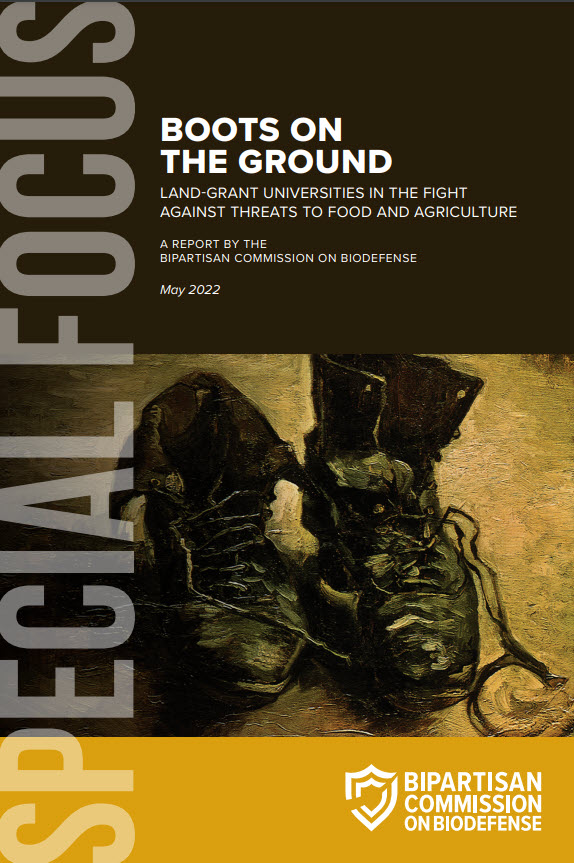Boots on the Ground: Land-Grant Universities in the Fight Against Threats to Food and Agriculture

- HYPOTHETICAL SCENARIO: AFRICAN SWINE FEVER DEVASTATES US PORK INDUSTRY
- EXECUTIVE SUMMARY
- INTRODUCTION
- COORDINATION
- EARLY WARNING
- RESEARCH AND DEVELOPMENT
- PREPAREDNESS, RESPONSE, AND MITIGATION
- CONCLUSION
- ACRONYMS
- APPENDIX A: MEETING AGENDA AND SPEAKERS
- APPENDIX B: LIST OF LAND-GRANT UNIVERSITIES
- ENDNOTES
Commissioners
Joseph I. Lieberman, Chair
Thomas J. Ridge, Chair
Donna E. Shalala
Thomas A. Daschle
Susan W. Brooks
James C. Greenwood
Margaret A. Hamburg
Kenneth L. Wainstein
Ex Officio Members
Yonah Alexander, PhD
William B. Karesh, DVM
Rachel Levinson, MA
I. Lewis Libby, JD
Gerald W. Parker, DVM, PhD
George Poste, DVM, PhD, DSc
Tevi Troy, PhD
Staff
Asha M. George, DrPH, Executive Director
Ambika Bumb, PhD, Deputy Executive Director
Robert H. Bradley, Policy Principal
John T. O’Brien, MS, Research Associate
Arienne O’Neil, Office Manager
Patricia de la Sota, Event Coordinator
ACKNOWLEDGMENTS
The Bipartisan Commission on Biodefense thanks Colorado State University for hosting a special focus meeting of the Commission on threats to food and agriculture. We thank the land-grant universities for their service to the Nation and the communities in which they reside and thank the Association of Public and Land Grant Universities for their support. We recognize Dr. Alan Rudolph for his leadership in the science and technology community and his undying commitment to strengthening the land-grant universities. We greatly appreciate the contributions of Dr. Keith A. Roehr, Colonel Brey Hopkins (US Army), Mr. Lee Leachman, Dr. Casey Barton Behravesh (US Public Health Service), Dr. Amy Delgado, Dr. John Hardham, Dr. Prasant Mohapatra, and Dr. Jane Christopher-Hennings to this effort, as well as consultation with Dr. Amy Kircher of the University of Minnesota and Dr. Ron Trewyn of Kansas State University. We offer many thanks to Dr. George Poste and Ms. Rachel Levinson of Arizona State University, Dr. Gerry Parker of Texas A&M University, Commission ex officio members, and the Scowcroft Institute of International Affairs for their additional input and research contributions. The Commission also expresses its gratitude for the financial support our donors provide and thanks Hudson Institute for serving as our fiscal sponsor.
Executive Summary
Land-grant universities are institutions of higher education designated by Congress or state legislatures to receive benefits associated with the Morrill Acts of 1862 (12 Stat. 503) and 1890 (P.L. 51-841, 26 Stat. 417), as well as the Equity in Educational Land-Grant Status Act of 1994 (P.L. 103-382 §531-535).2 As the United States works to identify critical biodefense gaps exposed by the Coronavirus Disease 2019 (COVID-19) pandemic, the Nation should also draw upon the resources and relationships land-grant universities possess to fill those gaps.
The food- and agro-biodefense challenge is different from, but as daunting as, biodefense of human public health due to the diversity of targets (e.g., livestock, crops, soil); spectrum of potential pathogens and pests; and different geographies, ecosystems, and infrastructures at risk. Land-grant universities are uniquely positioned to help defend the United States against biological threats to food, livestock, crops, wildlife, biofuels, pharmaceuticals, textiles, the environment, the bioeconomy, and the food and agro-economy, valued at more than $1 trillion annually. In serving the states, localities, tribes, and territories in which they reside, the land-grant universities have their boots on the ground in the fight against threats to food and agriculture.
The Commission makes the following recommendations to coordinate federal and land-grant food and agro biodefense efforts, provide early warning of threats to food and agriculture, and incorporate land-grant universities into preparedness, response, and mitigation of these events.
Copyright © 2022 by the Bipartisan Commission on Biodefense All rights reserved.
www.biodefensecommission.org
Graphics and design by Factor3 Digital.
Base cover art by Alamy.
Original art “A Pair of Shoes” by Vincent Van Gogh.
Suggested Citation
Bipartisan Commission on Biodefense. (2022). Boots on the Ground: Land-Grant Universities in the Fight
Against Threats to Food and Agriculture. Washington, DC: Bipartisan Commission on Biodefense
